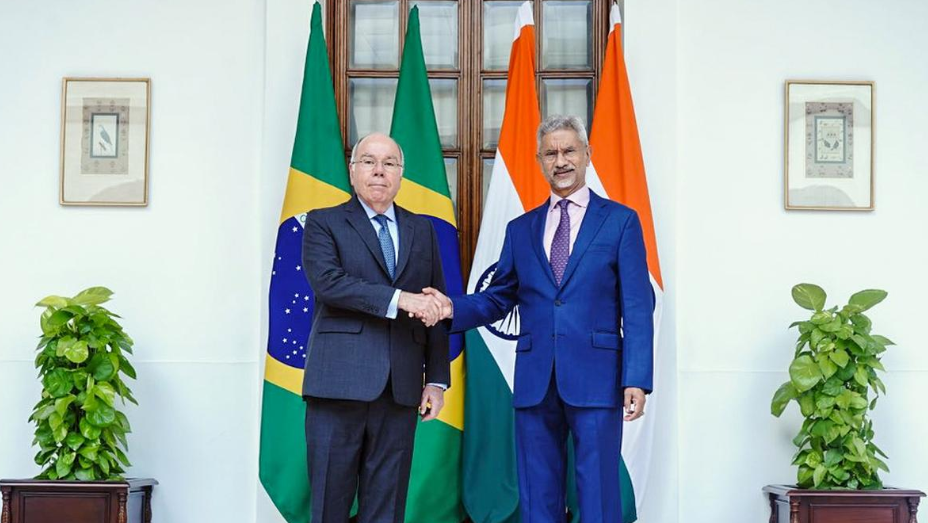Deepening India-Brazil Relations (GS Paper 2, International Relations)

Overview:
- The strategic partnership between India and Brazil has witnessed significant expansion and diversification across various domains including defense, space, technology, and people-to-people relations.
- Recently, the resolution of a World Trade Organization (WTO) dispute over sugar subsidies between the two nations has further strengthened their bilateral ties.
- This resolution also aligns with their growing cooperation in ethanol technology and addresses global sugar surplus issues.
What is the India-Brazil Sugar Subsidies Issue?
Background:
- In 2019, Brazil, along with Australia and Guatemala, challenged India’s sugar subsidy measures at the WTO.
- The complaint centered on claims that India’s subsidies violated the WTO’s Agreement on Agriculture.
- Critics argued that India had failed to report subsidies accurately, particularly regarding sugarcane and its derivatives, which were not included in domestic support notifications since the 1995-96 marketing year.
India’s Defense:
- India countered by asserting that sugarcane procurement is managed by private mills rather than the government, which aligns with fair trade practices.
- India argued that the calculations used by the US and Australia incorrectly considered all sugarcane production in a given year for subsidy assessments, including sugarcane not delivered to mills under the Sugarcane (Control) Order.
Major Areas of Cooperation Between India and Brazil:
Institutional Engagements:
- Strategic Dialogue: Led by National Security Advisors (NSA) from both countries, this dialogue addresses key regional and global issues.
- India-Brazil Business Leaders Forum: Focuses on trade, investment, and economic cooperation opportunities.
- Trade Monitoring Mechanism (TMM): Tracks and resolves bilateral trade issues.
- Economic and Financial Dialogue: Covers investment, trade, and monetary policy cooperation.
- Joint Defence Commission: Facilitates defense cooperation, including joint exercises and equipment procurement.
- Joint Committee on Science & Technology: Promotes research, development, and knowledge exchange.
Trade and Investment:
- Trade Growth: India became Brazil’s 5th largest trading partner in 2021, with bilateral trade increasing from USD 7.05 billion in 2020 to USD 15.2 billion in 2022. In 2023, India’s exports to Brazil were USD 6.9 billion and imports were USD 4.7 billion.
- Major Exports and Imports: Key Indian exports include agrochemicals, synthetic yarns, and auto components. Brazil’s imports from India include crude oil, gold, vegetable oil, and sugar.
- Investment: Significant investments have been made in sectors like automobiles, IT, mining, energy, and biofuels. India and Brazil signed a Preferential Trade Agreement (PTA) with MERCOSUR in 2004.
Defense and Security Cooperation:
- Defense Agreement: A defense cooperation agreement was signed in 2003, with regular Joint Defence Committee (JDC) meetings.
- Cyber Security: An MoU on Cyber Security was signed between CERT-In (India) and its Brazilian counterpart in January 2020.
Science and Technology:
- Space Collaboration: An agreement in 2004 led to cooperation in satellite data sharing and tracking. Brazil’s Minister visited India in 2021 for the Amazonia-1 satellite launch.
- Traditional Medicine: Ayurveda and Yoga are recognized in Brazil’s health policy, and an MoU on Traditional Medicine was signed in January 2020.
Energy Security:
- Bioenergy Research: An MoU between Indian Oil Corporation and Brazil’s CNPEM was signed in January 2020 to establish a bioenergy research institution in India.
- Global Biofuel Alliance: Launched during the G20 summit in 2023, this alliance aims to enhance biofuel production and demand.
Ethanol Blending:
- Technological Support: Brazil, a pioneer in ethanol production, has supported India’s ethanol blending program. Brazil’s ethanol blending rate is 27%, while India has achieved a 15.83% blending rate as of July 2024, with a goal of 20% by 2025-26.
-
Challenges in India-Brazil Relations:
Trade Deficit and Competition:
- Trade Imbalance: India consistently maintains a trade deficit with Brazil due to Brazil’s dominance in agricultural exports and India’s reliance on importing commodities like soybeans and sugar.
- Protectionist Measures: Both countries have adopted protectionist policies such as tariffs and subsidies, leading to trade frictions and hindering bilateral trade growth.
Diverging Interests:
- Climate Change Priorities: India and Brazil have differing priorities in international forums. India focuses on reducing emissions intensity and economic development, while Brazil prioritizes reducing Amazon deforestation.
- Multilateral Institutions: Their differing priorities also impact their positions within organizations like the UN and WTO.
Limited People-to-People Contact:
- Cultural and Educational Exchanges: There is limited people-to-people interaction between the two countries in business, cultural, and educational spheres.
Role of China:
- Influence of China: China’s status as Brazil’s largest trading partner could impact India-Brazil relations, potentially complicating strategic cooperation.
Way Forward:
Economic Cooperation:
- Diversification: Both countries should focus on diversifying trade to include value-added products and services. Creating a favorable investment environment and promoting bilateral trade through agreements and joint ventures are essential.
- Infrastructure Investment: Investments in infrastructure projects like transportation and logistics can enhance trade and connectivity.
People-to-People Exchanges:
- Cultural Diplomacy: Enhancing cultural diplomacy, student exchanges, and tourism can strengthen people-to-people ties and yield economic benefits.
Strategic Cooperation:
- Defense Collaboration: Expanding defense cooperation through joint exercises and technology sharing, while working together in global forums like the UN and G20, can advance shared interests.
Technology and Innovation:
- R&D Collaboration: Collaborative research in renewable energy, biotechnology, and IT can drive innovation and economic growth. Investment in skill development can improve workforce competitiveness in both countries.
Conclusion:
- India and Brazil have cultivated a multifaceted partnership that spans various sectors including trade, defense, science and technology, and energy.
- While there are notable challenges such as trade imbalances and diverging interests, the strategic cooperation and shared goals provide a solid foundation for future growth.
- By addressing these challenges and leveraging their strengths, India and Brazil can enhance their bilateral relations and contribute significantly to regional and global stability.


